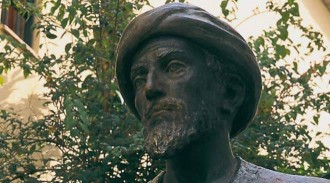
Biography
Moses Maimonides (ca. 1138-1204), Musa ibn Maymun ‘Ubaydallah al-Qurṭubi al-Andalusi al-Isra’ili in Arabic and Mosheh ben Maimon ha-Sefaradi in Hebrew, was born in what is now Cordoba, Spain (Qurṭuba, Andalusia), to a distinguished family of Jewish scholars and judges. Called by the Hebrew acronym RaMBaM or by the epithet “the Great Eagle” (Ha-Nesher Ha-Gadol, after Ezekiel 17:3) by later scholars, Maimonides was the foremost legal and philosophical Jewish thinker of the Middle Ages, probably of all time, as well as a prominent physician. Maimonides’ juridical accomplishments included the reworking and systematization of all of Jewish Law in two major legal compendia, the Commentary on the Mishnah and the Mishneh Torah. Maimonides served as the official Head of the Jews (ra’is al-yahud) in Fusṭāṭ (Old Cairo), and through his works and letters fundamentally influenced the development of Jewish Law throughout the world. He apparently mastered all philosophical works that were available to him, including works by Plato, Aristotle, al-Farabi, Avicenna and Avempace, and strove, especially in his Guide of the Perplexed, to reconcile them with the religious Law. Maimonides also served as a court physician to the Ayyubids in Egypt and was associated with al-Qadi al-Fadil, an important advisor to Saladin.
Maimonides’ many accomplishments followed a rather turbulent childhood and early adulthood, spent moving Eastward to avoid oppressive policies against Jews. Maimonides left Cordoba around 1148 after the invasion of the Almohads, a North African Berber tribe that imposed an extremely strict version of shari’a law that included inquisitions and persecutions against Jews, Christians and even Muslims. He spent the next twelve years in Spain, though it is not clear where, and apparently continued to receive a religious legal and literary education and possibly a medical one as well. Around 1160, Maimonides and his family lived in Fez, Morocco, possibly as outward Muslims, but crypto-Jews, where Maimonides continued his medical and scientific studies. As conditions worsened in Morocco, Maimonides moved to Acre (in 1165) and then to Egypt (in 1166), where he participated in and eventually led Jewish communal life. Much of Maimonides’ 38 years in Egypt saw great political change, including regime change and major religious changes. When Maimonides first arrived, Egypt was ruled by the Fatimids, an Isma’ili branch of Shi’ites, who were relatively open and tolerant rulers and whose religious teachings on esotericism involved Neo-Platonic ideas that appealed to Al-Farabi and probably influenced Maimonides as well. Later, after some years of hostilities, Saladin and the Sunni Ayyubids took over Egypt (1171). The Ayyubids favored a religious approach known as Asharite Kalam that Maimonides strongly criticizes in the Guide. The Ayyubids often dealt harshly with their critics and those they perceived as heretics; in 1191, Saladin’s son executed the philosopher-mystic Al-Suhrawardi in Aleppo. Maimonides, though, managed to remain in relative good favor with the regime throughout his life.
Maimonides’ legal and philosophical writings fundamentally redefined how Jewish Law was codified and studied and the place of philosophy and science in Jewish life. Maimonides’ writings also influenced Christian theologians, such as Alexander of Hales, William of Auvergne, Albertus Magnus, Thomas Aquinas, Meister Eckhart, and Duns Scotus. Further his legal works influenced the development of British and Dutch jurisprudence in the seventeenth century, especially the works of John Seldon and Hugo Grotius. Maimonides also influenced the philosophical works of Baruch Spinoza and Gottfried Wilhelm von Leibniz. Maimonides continues to be studied today throughout the world and continues to influence contemporary religious and philosophical thought.
For additional biographical resources, see also:
Joel Kraemer, Maimonides: The Life and World of One of Civilization’s Greatest Minds, New York: 2010.
Moses Maimonides —Physician, Scientist, and Philosopher, ed. Samuel Kottek and Fred Rosner, Northvale: 1993.